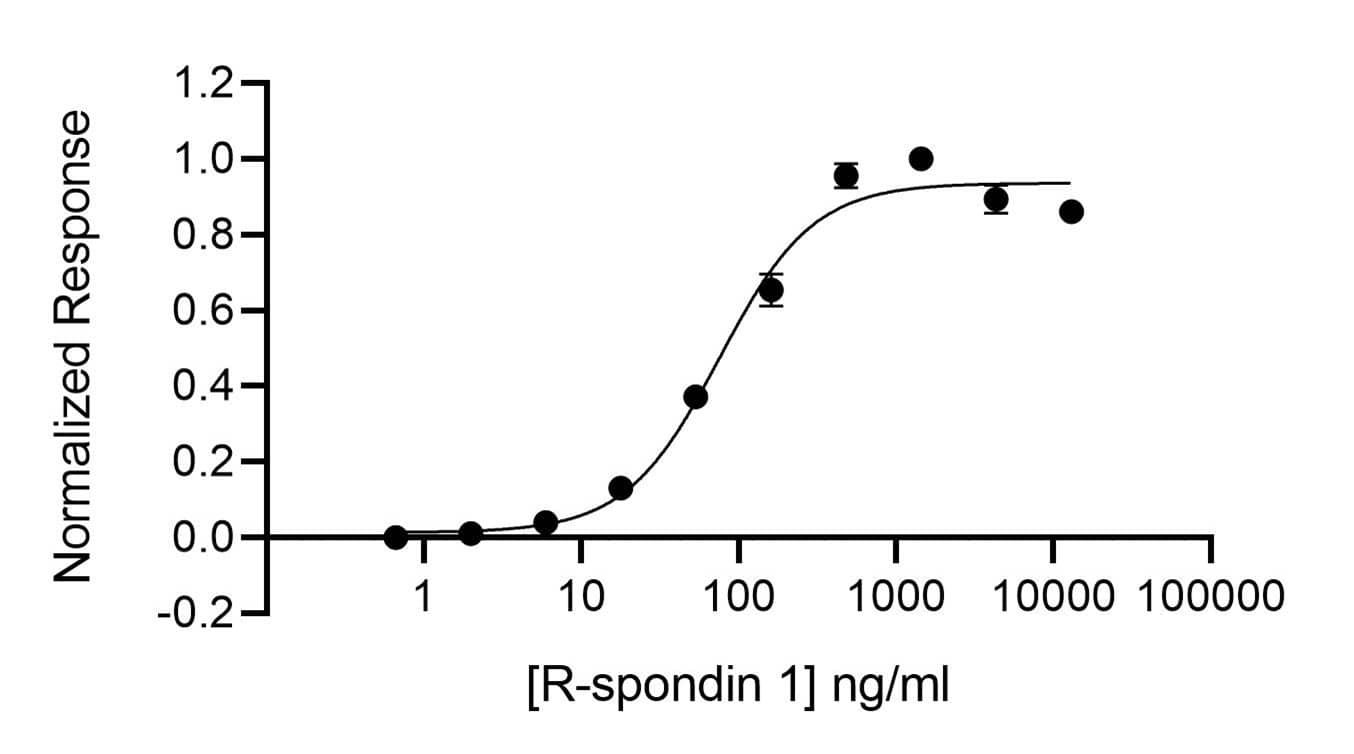Recombinant Human R-spondin 1, Animal-Free Protein
R&D Systems, part of Bio-Techne | Catalog # Qk006

Key Product Details
Product Specifications
Source
Purity
Endotoxin Level
Predicted Molecular Mass
SDS-PAGE
Activity
Mycoplasma
Scientific Data Images for Recombinant Human R-spondin 1, Animal-Free Protein
Recombinant Human R-spondin 1, Animal-Free Protein Bioactivity
R-spondin 1 activity is determined using the Wnt-responsive firefly luciferase reporter assay as it enhances Wnt-beta catenin signaling in HEK239T cells. HEK293T cells transfected with reporter TOP-FLASH are treated in triplicate with increasing concentration of R-spondin 1 (diluted in DMEM with 0.5 % of FCS), in the presence of Wnt-conditioned media (1:8 dilution). Cells are grown overnight, and luciferase activity is measured and normalized.EC50 = 75.5 ng/ml (5.8 nM).Recombinant Human R-spondin 1, Animal-Free Protein SDS-PAGE
RSPO1 migrates as a single band at 16 kDa in non-reducing (NR) and 13 kDa in reducing (R) conditions.Purified recombinant protein (7 µg) was resolved using 15% w/v SDS-PAGE in reduced (+ beta-mercaptothanol, R) and non-reduced conditions (NR) and stained with Coomassie Brilliant Blue R250.Formulation, Preparation and Storage
Qk006
| Formulation | Lyophilized from acetonitrile/TFA |
| Reconstitution | Resuspend in 10mM HCl at >100 µg/ml, prepare single use aliquots, add carrier protein if desired. |
| Shipping | The product is shipped lyophilized at ambient temperture, on ice blocks or dry ice. Shipping at ambient temperture does not affect the bioactivity or stability of the protein. Upon reciept, store immediately at the conditions stated below. |
| Stability & Storage | Store lyophilized protein between -20 and -80 °C until the date of expiry. Avoid freeze-thaw cycles. |
Background: R-Spondin 1
R-Spondin 1 (RSPO1, Roof plate-specific Spondin 1), also known as cysteine-rich and single thrombospondin domain containing protein 3 (Cristin 3), is a 27 kDa secreted protein that shares ~40% amino acid (aa) identity with three other R-Spondin family members (1, 2). All R-Spondins regulate Wnt/ beta-Catenin signaling but have distinct expression patterns (1-3). R-Spondin 1 competes with the Wnt antagonist DKK-1 for binding to the Wnt co-receptors, Kremen and LRP-6, reducing their DKK-1-mediated internalization (4). However, reports are mixed on whether R-Spondin 1 binds LRP-6 directly (4-6). R-Spondin 1 is expressed in early development at the roof plate boundary and is thought to contribute to dorsal neural tube development (3, 7). In humans, rare disruptions of the R-Spondin 1 gene are associated with tendencies for XX sex reversal (phenotypic male) or hermaphroditism, indicating a role for R-Spondin 1 in gender-specific differentiation (7, 8). Mutations in R-Spondin 1 are also linked with palmoplantar keratoderma, abnormal thickening of the skin on the palms of the hands and soles of the feet (7, 8). Postnatally, R-Spondin 1 is expressed by neuroendocrine cells in the intestine, adrenal gland and pancreas, and by epithelia in kidney and prostate (9). Injection of recombinant R-Spondin 1 in mice causes activation of beta-catenin and proliferation of intestinal crypt epithelial cells, and ameliorates experimental colitis (9, 10). Interest in R-Spondin 1 as a cell culture supplement has grown with the expansion of the organoid field. R-Spondin 1 is widely used in organoid cell culture workflows as a vital component that promotes both growth and survival of 3D organoids (11).
Structurally similar to other R-Spondins, R-Spondin 1 contains two adjacent cysteine-rich furin-like domains (aa 34-135) with one potential N-glycosylation site, followed by a thrombospondin (TSP-1) motif (aa 147-207) and a region rich in basic residues (aa 211-263). Only the furin-like domains are needed for beta-catenin stabilization (2, 12). A putative nuclear localization signal at the C-terminus may allow some expression in the nucleus (13). Potential isoforms of 200 and 236 aa have an alternate, shorter N-terminus or are missing aa 146-208, respectively (14). Over aa 21-263, human R-Spondin 1 shares 89%, 87%, 92%, 91%, 91% and 89% aa identity with mouse, rat, horse, dog, goat, and cow RSPO-1, respectively.
References
- Chen, J-Z. et al. (2002) Mol. Biol. Rep. 29:287.
- Kim, K.-A. et al. (2006) Cell Cycle 5:23.
- Nam, J.-S. et al. (2007) Gene Expr. Patterns 7:306.
- Binnerts, M.E. et al. (2007) Proc. Natl. Acad. Sci. USA 104:14700.
- Nam, J.-S. et al. (2006) J. Biol. Chem. 281:13247.
- Wei, Q. et al. (2007) J. Biol. Chem. 282:15903.
- Kamata, T. et al. (2004) Biochim. Biophys. Acta 1676:51.
- Parma, P. et al. (2006) Nat. Genet. 38:1304.
- Kim, K.-A. et al. (2005) Science 309:1256.
- Zhao, J. et al. (2007) Gastroenterology 132:1331.
- Drost and Clevers. (2018) Nature Reviews Cancer 18:407.
- Kazanskaya, O. et al. (2004) Dev. Cell 7:525.
- Tomaselli, S. et al. (2008) Hum. Mutat. 29:220.
- UniProt # Q2MKA7.
Long Name
Alternate Names
Gene Symbol
UniProt
Additional R-Spondin 1 Products
Product Documents for Recombinant Human R-spondin 1, Animal-Free Protein
Product Specific Notices for Recombinant Human R-spondin 1, Animal-Free Protein
The above product was manufactured, tested and released by R&D System's contract manufacturer, Qkine Ltd, at 1 Murdoch House, Cambridge, UK, CB5 8HW. The product is for research use only and not for the diagnostic or theraputic use.
For research use only

